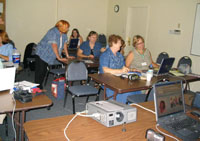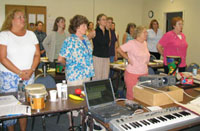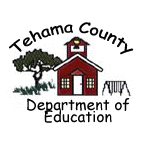Computers

The computer workshop examines research on the use of computers to promoteliteracy and numeracy in Early Childhood Education. Computer activities and educational software applications will be evaluated in terms of developmentally appropriate instruction and effectiveness for young children. Information literacy will be defined and issues regarding the ethical, legal, and safe use of the Internet will be examined. Students will create professional documents for teacher productivity and communication with parents, colleagues, and children. Students will create an electronic portfolio for professional growth and assessment, learning how to digitize artifacts that provide evidence of teacher competency according to state and national standards. Students will learn how to use ClipBoard, the web-based electronic portfolio system for Early Childhood Educators.
Circle Training

|
CIRCLE offers face to face training by certified trainers. The training is based on the most recent scientific research and meets the needs of adult learners. These sessions are interactive and provide fun hands on activities. Upon return to classrooms, participants have a deeper understanding of early literacy development and a wealth of ideas for implementation. Trainers will be provided with the necessary tools to give effective training. Focus is on training methodology, techniques and presentation styles, grouping strategies, games, and evaluation |
Music, Literacy, and Numeracy

The Music, Literacy, and Numeracy workshop is aimed at teachers who do not have musical training. The readings and lesson plan assignments are focused on musical activities that support literacy and numeracy in the preschool classroom. Current brain research is helping us understand of how children learn. Neuroscience has allowed us to see the effect of music on the brain. Musical participation stimulates brain activity, involving the visual, auditory, and kinesthetic senses. The relationship between language and music has been recognized throughout history, particularly as words are expressed through melody and rhythm. Melody is built on the natural phrasing, rhythm, pitch, accent, syllabication, and rhyme of language. Music and math are linked through the natural proportions of rhythm and acoustics. Music notation, like the written word or numeral, is a symbolic representation of sound in time. Click on the Powerpoint Presentation

